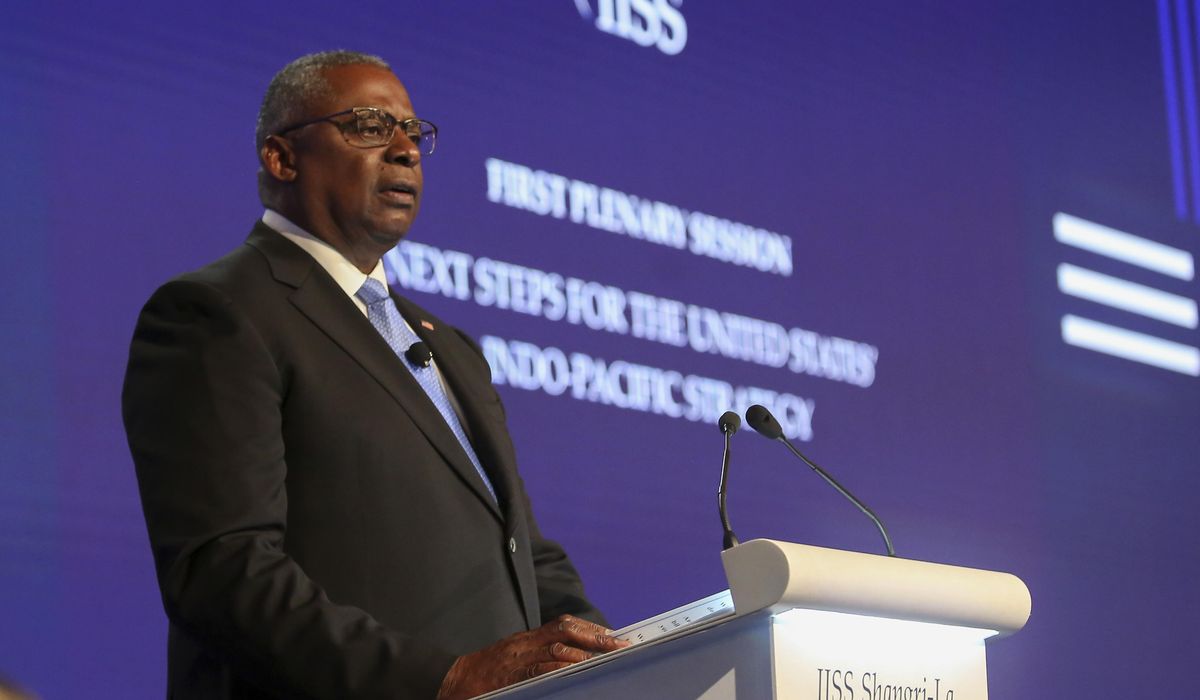

The U.S. is to blame for rising tensions in the Pacific, and America’s Indo-Pacific strategy to further divide the region is “doomed to failure,” a leading Chinese military official said Sunday.
The sharp comments from Chinese Lt. Gen. Zhang Zhenzhong came just hours after U.S. Defense Secretary Lloyd Austin spoke at the high-level Shangri-La Dialogue in Singapore and blasted China’s escalating military pressure campaign on Taiwan, the island democracy Beijing considers part of its sovereign territory and has vowed to capture.
The normally reserved Mr. Austin delivered a stinging rebuke of China’s rapidly growing military footprint throughout the Pacific, specifically its recent military aircraft flyovers near Taiwan.
“We’ve witnessed a steady increase in provocative and destabilizing military activity near Taiwan,” Mr. Austin said. “And that includes PLA aircraft flying near Taiwan in record numbers in recent months—and nearly on a daily basis.”
Mr. Austin committed to defending U.S. interests in the India-Pacific “without flinching.” He pledged that the U.S. would help maintain “peace and stability” in the Pacific and would continue to provide aid to Taiwan’s defense forces.
But Gen. Zhang defended his country’s diplomatic and military strategy in the Pacific and said the U.S. is wading into dangerous territory by playing the “Taiwan card” at every opportunity.
SEE ALSO: U.S. ‘doomed to failure’ in Pacific vows Chinese military official
“The Taiwan question is the one question that could most easily lead the China-US relations into conflict. Mishandling of the Taiwan question will have a destructive impact on bilateral ties. The People’s Liberation Army always stands ready to resolutely safeguard national sovereignty, security and territorial integrity at any cost,” said Gen. Zhang, deputy chief of the joint staff department at China’s Central Military Commission.
“The U.S. Indo-Pacific strategy is a strategy that goes against historical trends and prevailing will of regional countries. It only serves the U.S. own interests and therefore is doomed to failure,” Gen. Zhang said, according to the media outlet China Daily.
“The United States is the biggest source of instability in international order, the backstage manipulator for global turmoil and a dangerous threat to regional peace and stability,” he said.
Mr. Austin in his remarks underscored the U.S. adherence to the “One China” policy, a diplomatic acknowledgment of Beijing’s assertion that there is one Chinese government but allows informal relations with Taipei.
“We do not support Taiwan independence,” Mr. Austin said. “And we stand firmly behind the principle that cross-strait differences must be resolved by peaceful means.”
Nonetheless, he said the U.S. will continue to fulfill its commitments under the Taiwan Relations Act.
“That includes assisting Taiwan in maintaining a sufficient self-defense capability,” he said. “And it means maintaining our own capacity to resist any use of force or other forms of coercion that would jeopardize the security or the social or economic system of the people of Taiwan.”
“Our policy hasn’t changed,” he said. “But unfortunately, that doesn’t seem to be true for the PRC.”
